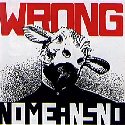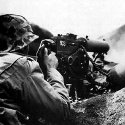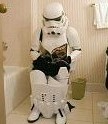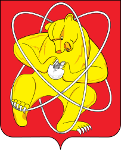|
bewbies posted:Sure. This all makes sense, thank you for the info. I am leery of using Hardy as a source generally, because he is very strongly biased in favor of the longbow. However, without seeing the actual source that he draws from, or throwing out another length for a pace, I can't contest it. quote:Essentially any sort of leather, mail, or light plate armor that was less than 1mm thick. The typically cited penetration of a proper arrow at 300m was an inch into oak, which would have been sufficient to penetrate any of the above. Thicker plate armor is obviously a completely different monster of course. Mail is actually quite resilient to arrows if supplemented (as it always was) by the all-important textile armour underneath. There is plenty of evidence, and Strickland goes into it pretty thoroughly in Warbow, that mail armour was fairly resilient to arrows, especially at range. Close in is another story, of course, and there are examples of arrows piercing folk at the armpits from fairly early on, so they weren't impervious by any means. Leather armour I'm less sure of, since it was uncommon in the West, where textile armours were often preferred, and Eastern European sources are largely too vague or too destroyed to provide much detail. As for light plate, I again have my doubts, but the sources do not specify who had light plate and who had heavy plate so I cannot say for sure. Strickland also points out that no adequate tests on arrow penetration vs. mail have been done to date. Where are you getting the 1-inch penetration into oak? It sounds like an extrapolation from Gerald of Wales' account of an arrow penetrating a handspan through an oak door, which is fairly plain exaggeration from a propagandist. quote:I was thinking of a modern platoon size, 40 firers or so. OK. quote:I'm not totally sure what your point is here. Of course a smoothbore musket is physically capable of shooting long distances, but it isn't a militarily useful tactic. My point is simply that I think in your hypothetical scenario the longbowmen would not escape without casualties, given the numbers employed. quote:This is probably a good estimate; that said, in speaking of the monster bows with which I did the calculations above, I would bet the training would have to be almost daily in order to get the necessary strength in a 4-6 year time period. No arguments here. quote:I suppose I'm operating under an assumption that Napoleonic-era conscripts would be somewhat categorically more formidable in CQB just due to the fact that they would be in a proper formation and as such they could conduct a coordinated charge. If we're talking about 1 v 1 kind of fighting my money would probably be on the medieval soldier. There is value in that, but I'm not sure if the disadvantages of the bayonet as a weapon would be adequately compensated for. I am also not sure that the archers could not themselves execute a competent charge. Really, I am just taking the coward's way out and you are probably right. 
|
|
|
|

|
| # ? Apr 28, 2024 07:28 |
|
Well it has been almost a month since anyone posted in here so it looks like me and Rodrigo Diaz done killed it.  Anyway, I just finished reading Follett's Fall of Giants, which is relatively light reading but very fun and pretty well written (in other words, Ken Follett. Also, I read the thousand pages in roughly 3 days so it is quite a page turner). It had some of the most vivid and accurate depictions of infantry warfare in WWI that I've read in a novel, which was kind of surprising to me, and since that is an area of history I'm extremely interested in I was pretty engrossed. Anyway, it got me reading on the Somme again, which I've written about before quite a while back. To me at least, it is one of the most interesting battles mankind has ever fought; it perfectly encapsulated WWI in a number of ways, along with highlighting the problems with the dying European class system (Follett uses the battle as a framework for this discussion). The British at the Somme were just...lol. Somme was really their first all-out assault, one which they carried out largely themselves (along with the Commonwealth of course). The French by this time had actually evolved their tactics somewhat and were pretty much disinterested in major offensives; the British, on the other hand, were raring to go and saw this particular offensive as their chance to redeem themselves after being pretty badly mauled in most of their other major efforts (in particular the defense of Paris early on in the war). They did learn quickly though, and wound up accomplishing something (killing a lot of Germans) at the end of it all. Early on, just about everything they did was terrible. They bombarded the German trenches literally for weeks beforehand and accomplished very little in the way of suppression or attition; all it really did was tell the Germans exactly where the assault was coming (the Germans were well dug in and only around 5% of the British shells were designed to do anything but explode on the surface). The infantry assault followed this bombardment, but not very quickly, so the Germans had plenty of time to man their machine gun positions. This battle was probably the best example of what we all think of when we picture the lines of soldiers being mowed down by machine guns; this is exactly what happened for the entire day on July 1, 1916, when the British suffered 57,000 casualties with 20,000 KIA (for reference the US lost ~57k soldiers in the entirety of the Vietnam War). Eventually, smart and more experienced British officers and particularly NCOs (nearly all of whom were from common backgrounds) figured out that small unit actions, which involved quick movements supported by suppressive fire, was a hell of a lot more effective. They went about fighting like this throughout most of the rest of the summer, actually gaining territory and succeeding a bit, before Haig took over and decided it was time for another BIG PUSH (more on why later). This BIG PUSH happened in late September, using a "creeping barrage" and huge formations, and 82,000 more casualties were exchanged for less than a mile of territory. Finally, the tank was introduced (it failed), and by November Haig was ordering meaningless attacks (it was too late in the season to exploit any gains) in order to brag to the French and provide good copy for British newspapers. A couple of interesting tactical dynamics came out of the Somme which influence operations up to this day. First, the ineffectiveness of massive, long term artillery bombardments was demonstrated pretty clearly. Initial casualties from a major bombardment might be heavier as the enemy is surprised, but once he has a chance to dig, little damage will be done regardless of how many shells are fired. The effect of these bombardments was continuously undercut by the fact that the initial bombardments were usually light (as not all the guns and ammo were in place), which gave the enemy a chance to dig in and survive the heavy bombardment that came later. In related news, the ineffectiveness of the "creeping barrage", considered to be the pinnacle tactical development of the time, was demonstrated clearly. The idea was the infantry walked right behind an artillery barrage that slowly moved forward, which left the infantry to just clean up what was left, but in reality the defenders would simply take cover as the shells went by and then shoot the infantry as they approached. The really bizarre thing was that the British commanders simply didn't understand (or refused to understand) that these methods were ineffective. Their soldiers would go out, get shot all to hell, report that the Germans were still there and that the shelling did nothing...and the British commanders would simply rinse and repeat the next day. The whole thing was mystifying. Second, it displayed the modern tendency to move to smaller and smaller formations. During the Napoleonic/ACW era, a battalion (~500 soldiers) was usually the smallest element that maneuvered individually on a battlefield, and regimental movements were far more typical. By the time of the Somme, the French and Germans had both started operating with platoon (~40 soldiers) sized elements, but the British insisted that nothing smaller than a company (~120 soldiers) could operate effectively. Ironically, it was the slaughtering of their companies that eventually led to the British figuring out that smaller formations were indeed more effective (in other words, attacks with companies at 30% strength were as or more effective than attacks by companies at 100% strength), and so began the basis of their transition to something approaching reasonably modern tactics. Third, a couple of isolated battles showed the way of the future. Specifically, the fight at a little village called Guillemont looked a lot more like a WWII battle than a WWI battle. With the German defenders dug in, a couple of Commonwealth regiments attacked and cut off the town, then fought the Germans down to the man in brutal small unit actions; in this way it looked a lot more like Normandy or Barbarossa; it was also similar in that it resulted in the complete destruction of the defending unit, something that was surprisingly rare in WWI. The tank also had some limited success, showing that it could in fact roll past dug in infantry, but instead of being used to attack rear echelon areas, the tanks were just parked along the trenches and used to shoot at dug in infantry. Anyway, this post was kind of rambling, I forgot what my initial point was.
|
|
|
|
bewbies posted:Anyway, this post was kind of rambling, I forgot what my initial point was. No way, keep it up! There's nowhere near enough out there about WWI and I had no idea about the evolution of small unit actions from that war. Please go on.
|
|
|
|
Agreed. Can you tell us anything about the role of the Ottoman Empire in WWI?
|
|
|
|
I'm a history major, a sophomore at the moment. I am really interested in military history, especially 20th century, pretty much anything in the 20th century before the breakup of the USSR. I dont want to do ROTC though, as that focuses primarily on the branch and the US side of things, and I want a more global perspective. How and where would I get a degree in military history?
|
|
|
|
KanadianKomrad posted:I'm a history major, a sophomore at the moment. I am really interested in military history, especially 20th century, pretty much anything in the 20th century before the breakup of the USSR. I dont want to do ROTC though, as that focuses primarily on the branch and the US side of things, and I want a more global perspective. How and where would I get a degree in military history? Military history really only exists as a graduate degree, and the job market for military history MA and PhD candidates is really kind of non-existent, just like every other history degree. Since a general history degree can cover anything from military history to African history, just concentrate on such focused classes in your undergrad.
|
|
|
|
About recent military history, there is a neat little detail from the Georgian war about unit sizes and tactics. Apparently, the US-trained Georgian army was a pushover for the Russian troops simply because the Georgian army had been training mostly small-unit tactics and COIN operations, so there was great difficulty in coordinating troops for any sort of counterattacks or even static defense against the Russian armored units.
|
|
|
|
bewbies posted:
Well I think much of the effectiveness of the creeping barrage hinged on how it was used and the competence of the commander of the attack, for example the Canadians used the creeping barrage pretty effectively during Vimy Ridge and the battle for Hill 70. Unfortunately the BEF was poorly led by Haig particularly in regards to teh use of artillery.
|
|
|
|
I'm a video game designer and I'm developing a turn-based artillery game simulating tanks. Many of the features of my game were inspired by actual and historical warfare. I'm trying to figure out a good, simple way to add obstacles such as rivers and cliffs to my game, and I'm looking at real-life tanks as the inspiration to figuring out how I'm going to balance them. May of the game's mechanics were inspired by real-life situations, such as having to maintain supply lines, having to spot for artillery, and the general movement/strength differences between tanks and infantry. I saw a military channel special on ... I think it was Alexander who was attacking ... I think it was somewhere in India, and he had to cross a river, but on the other side of the river was an opposing army. Naturally if you try to cross a river, even a shallow one, then you're pretty drat helpless until you reach the other side, so he had to trick the enemy into thinking he would cross in one place and then went and crossed in another. Anyway I'm trying to think of a good way to have rivers do the same kind of thing. What I'm currently thinking is that it takes more time to cross the river than regular terrain with the tanks, and while crossing tanks can't fire and their shields (yes tanks have energy shields in this game) go down until they're back on dry land. What say the military history geniuses in this thread? Is that a good way to deal with a mobility blocker such as a river? Any other ideas inspired by the great events in history?
|
|
|
|
Vino posted:I'm probably making a fool out of myself but aren't bridges good at this?
|
|
|
|
What? You can't just build a bridge in the middle of a battle. Or am I missing what you're trying to say?
|
|
|
|
The Guns of August is a very interesting book that goes into great detail about the first month of the war. Highly recommended.
|
|
|
|
Glad to see life in this thread... Keep the WWIness coming. Anyone suggest any good books/movies about the Eastern Front in WWII?
|
|
|
|
Grand Prize Winner posted:Agreed. Can you tell us anything about the role of the Ottoman Empire in WWI? Retired US Army officer and historian Edward Erickson did a really good, groundbreaking study on them a few years back (and one on the Ottomans in the Balkan Wars). The problem is that the book is extremely expensive, so I haven't read it. Even on Kindle it's still over $100.
|
|
|
|
Vino posted:What? You can't just build a bridge in the middle of a battle. Or am I missing what you're trying to say? Well, there are bridgelayer tanks, for example. 
|
|
|
|
Puukko naamassa posted:Well, there are bridgelayer tanks, for example. That's a great idea! Thanks. Any other thoughts on how to add things like rivers or cliffs into the game are welcome. Or, if someone just wants to tell a story about some time when a river or forest or cliff or other natural obstacle proved to be important during a battle, I'd love to hear.
|
|
|
|
Vino posted:That's a great idea! Thanks. Read about military history much? I think the Games forum would be a better place for you.
|
|
|
|
Vino posted:That's a great idea! Thanks. They're always important but they're also always planned for, so it's hard to imagine a good parallel for your tanks game. You might use a combined armor/infantry task force to try to break through a defensive line and seize a bridge intact. If the obstacle was shallow enough that armor could ford and fight, a commander might try that. I don't know, off the top of my head, of a situation where a commander had his armor cross underwater onto a defended shore. My limited understanding is that you're use artillery and assault engineers to gain a bridgehead, then use underwater fording (if available) or set up a steadily improving series of bridges to get armor across. A Bridge Too Far describes the first Allied attempt to gain control of Rhine crossings in WWII. It's a great book, but the spearhead was airborne infantry, not armor.
|
|
|
|
What was your reaction to Nusbacher's sex change  http://www.thesun.co.uk/sol/homepage/news/article27762.ece
|
|
|
|
Why is the Korean War called "The Forgotten War," besides the fact that no american under 45 knows anything about it? Was it important?
|
|
|
|
I'm seconding this....I the only thing I know about the Korean war was that someone wanted to drop an A-bomb on the Chinese towards the end.
|
|
|
|
I'm no historian, but I'm going to guess that the Korean War was overshadowed by World War 2, which had ended less than a decade prior. After beating the Nazi's and Imperial Japan most people were probably just sarcastically thinking "Oh no, Koreans! Scaarrryyyyy..." and then went back to telling their awesome WW2 stories. Am I right?
|
|
|
|
Kemper Boyd posted:About recent military history, there is a neat little detail from the Georgian war about unit sizes and tactics. While this may be true, the war was over before it begun in my opinion. Russia had their troops massed on the border. It seems like they set a trap that Saashkavili jumped right into.
|
|
|
|
itrorev posted:I'm no historian, but I'm going to guess that the Korean War was overshadowed by World War 2, which had ended less than a decade prior. After beating the Nazi's and Imperial Japan most people were probably just sarcastically thinking "Oh no, Koreans! Scaarrryyyyy..." and then went back to telling their awesome WW2 stories. I've heard that this was the mindset of many Korean War veterans, in the way that they felt shafted by their country and history, like their war "wasn't important enough". Not as bad as the mindset by Vietnam Veterans ("your war was terrible, let's just forget about it"), but I see how it would still be annoying.
|
|
|
|
Robokomodo posted:Why is the Korean War called "The Forgotten War," besides the fact that no american under 45 knows anything about it? Was it important? Probably because there's no clear winner like WW1 and WW2.
|
|
|
|
I work retail, and one of the regular customers I see several times a week is always wearing a Korean War Vet cap, and a half dozen pins/etc stuck in it. I struck up a short conversation with him, and found that A) they were given summer clothing to wear while fighting in mountain weather, and B) it was not really a fun time for anyone. When I tried to end the conversation on a bit of a lighter note to make him feel better, "At least you made it back intact", I got "No, I'm missing three toes thanks to frost-bite." I am never going to bitch about how my feet are chilly when near the outside wall of my apartment again. Where can I go to find out more about this war? All I know about it, in entirety, is that: -Northern Korea favored Communism -We supported South Korea because FREEDOM (which means no communists) -China supported North Korea -MacArthur wanted to create a No-Man's Land by dropping enough nukes across Korea to stop anyone from trying to venture into the radiation, to cut off China's support. Edit: Hell, I don't even know what gear they had, behind hearing that they used BARs
|
|
|
|
Revolvyerom posted:Edit: Hell, I don't even know what gear they had, behind hearing that they used BARs It was basically the same stuff they had in WW2. For example the initial U.S. forces that went to Korea were equipped with the M9 "Bazooka", despite there being a newer, more effective M20 "Superbazooka". The M20 hadn't been put to widespread use due to budgetcuts in the immediate post-WW2 years, so American soldiers had to go up against T-34's with M9s, which reportedly wasn't very effective, and the problem was aggrevated due to to the use of deteriorated WW2-era ammo stockpiles.
|
|
|
|
Revolvyerom posted:I work retail, and one of the regular customers I see several times a week is always wearing a Korean War Vet cap, and a half dozen pins/etc stuck in it. I struck up a short conversation with him, and found that A) they were given summer clothing to wear while fighting in mountain weather, and B) it was not really a fun time for anyone. When I tried to end the conversation on a bit of a lighter note to make him feel better, "At least you made it back intact", I got "No, I'm missing three toes thanks to frost-bite." Wikipedia's Korean War page is actually quite well written and cites its sources. Check that out, and if you want to know more look for some books. For all that its known as the "forgotten war" there's plenty of literature about it. Edit: Is should note that the main Korean War page is very concisely written, and then links you to other pages giving more details of specific parts of the war, some of which aren't as well done. As usual Wikipedia is a nice starting point for an overview, but don't rely on it for details. LimburgLimbo fucked around with this message at 09:57 on Nov 22, 2010 |
|
|
|
I'm not sure this fits with the Military History label but do you guys have any good advice for books dealing with current day military industry? I know SIPRI releases yearly reports but I would like to have something more of an introduction to the topic.
|
|
|
|
dividebyzero posted:No way, keep it up! There's nowhere near enough out there about WWI and I had no idea about the evolution of small unit actions from that war. Please go on. Very well then! The great irony surrounding the tactics used by all of the great powers is that they represented a pretty amazing regression from what the Prussians had figured out during the Franco-Prussian War. The basic idea from the time firearms started populating the battlefield was that infantry was most effective in large, disciplined formations, as their fire would be massed and they would be well prepared for close-quarters action. This is what we're all familiar with from the Napoleonic Wars and the American Civil War; giant monolithic hordes of soldiers being marched around in parade ground formations, attempting to gain localized superiority of fire and then eventually charge, with the goal of "breaking the line" of the enemy which would then precipitate a retreat. Artillery was kind of secondary in this equation, it could be locally devastating but its primary role was to provide direct fire support for the infantry in much the same way that machine guns would in later conflicts. By the time of the Franco-Prussian War, however, small arms (particularly the Chassepot rifle, which was one of the more devastating infantry weapons ever) had become so effective that mass fires were really no longer necessary to conduct either attack or defense (I'll argue briefly this wasn't the case in the ACW due to the musket's low ROF and the fact that it was muzzle loading). The French hadn't really figured this out yet but the Prussians did, and the way they employed their forces throughout the war was pretty strikingly modern. Generally speaking, they avoided strongpoints, kept pressure on the enemy's flanks, employed smaller, more autonomous, more mobile units, used their artillery to support the infantry, and pretty consistently kept the French off balance and on the defensive despite the French having a vastly superior infantry weapon (in fact, in the few cases where units matched fires, the French absolutely slaughtered the Prussians). The Prussians eventually won of course, and so set the table for WWI. Early on in WWI, the Germans, particularly on their drive to Paris, fought pretty much exactly how they had in 1870. The French and particularly the British moved vey slowly in response, and the Germans used their rail network, horses, and primitive trucks very effectively in moving men and material. They continually outflanked the northern end of the Allies' line throughout Belgium and thus got almost all the way to Paris very quickly before finally running out of steam at the Marne (due largely to stretched supply lines). The Allied counterattack was pretty similar, continually trying to flank the Germans (against mostly to the north), which worked sort of, but the Germans didn't give much and eventually they just started to try flanking each other over and over and over until eventually they reached the ocean. Both sides dug in, and so we have the class WWI trench lines as we all remember them. It was at this point that traditional military tactics began to break down. The old school Prussian concept involved turning the flank of an entire army: one fixed one's opponent at one point, and then went round him at another. This action was conducted by large forces (thousands of soldiers), with the key objective being destroying the enemy's forces where they stood (this is an important point). This is how both sides thought, and no one could come up with any better ideas. This is what created the sort of regression to static trench warfare. Since both lines went from the Alps to the sea (and thus there was no chance of "outflanking"), commanders thought that they had to "break through" (frontal assault) the enemy's lines at a particular point in order to "flank" (sort of), envelop and destroy the opponent. However, the power of bolt action rifles, machine guns, and particularly modern artillery (this, not the machine gun, was the major game-changer tactically during WWI) made large scale frontal assaults completely ineffective. The commanders' response to this was to try and make frontal assaults as effective as possible. If a week of artillery preparation wasn't enough, why not try a month? If HE isn't killing enough enemy soldiers, why not use gas? Two divisions couldn't break through? Let's try five! So on and so on it went, with the intensity increasing constantly until you had bloodbaths like Verdun and Somme that were so bad it threatened to break the backs of entire armies. In particular, the weeks-long artillery bombardments were testaments to sheer stupidity, as they let the enemy know exactly where an attack was coming and gave them time to move thousands of men and their required supplies to reinforce the line at that point. Defensive concepts at the time reflected these offensive tactics. Essentially, there was little defense-in-depth as there was so little threat of an actual breakthrough: the defenses were designed to be as strong as possible everywhere, which was thought to minimize the chance of an actual breakthrough. This, of course, made reserve forces/reinforcements much more difficult to come by, which would eventually be a major undoing for the Allies. Finally, eventually, people (first cold and hungry Russians, then slightly less hungry German junior officers and NCOs) figured out something about lines: they are funny things, especially in a war like this where the lines were so static for so very very long. You could shell an enemy trench for weeks on end and when you charge it they'll still be able to shoot you all to hell, but you can send a squad or platoon across no man's land on a trench raid (amusingly enough usually to try and steal food, or clothes and guns/ammo if you were a Russian) and they'll come back unharmed most of the time. They put this thinking to use, and figured out that surprise and speed were much more effective force multipliers than artillery or gas could ever be, and thus infiltration tactics, a sort of precursor to blitzkrieg and even modern combined arms tactics, were born. The evolved infiltration tactics that the Germans very nearly won the war with went something like this: - very brief but very accurate artillery bombardment on a small section of the enemy line suspected to be a weak point, designed to suppress the enemy rather than kill him - fast moving infantry attacks the weak point quickly and violently, bypassing strong points and seeking out command/communitation/supply/mobility nodes in the enemy's rear in order to disrupt reinforcement and movement - heavier units move up through the breach and dig in to defend territory gained - enemy is confused and starts abandoning strong defensive positions as they are now very vulnerable to flank attacks - follow-on attacks are conducted that mop up any enemy soldiers who haven't bugged out yet Essentially, they figured out that local numerical superiority is worth a whole lot more than overall numbers: in a particular sector you might be attacking a 13,000 man division with a 10,000 man division, but at the point of attack, you can bring a thousand man battalion against a 200 man company: since the enemy has spread his forces equally across his entire section of front, you can concentrate your forces on a single point and overwhelm him there. Once this is accomplished, you can attack key positions in the rear, and once his C2 is compromised, his numerical superiority means little as he cannot effectively communicate to nor move his forces as necessary to defend against your follow on attacks. Once they figured this business out the German attacks were incredibly effective. They began using modern suppression/movement techniques (eg, one unit moves while the unit next to them fires, and vice versa) despite the relative lack of mobile machine guns (the ideal suppression weapon), and eventually they just did away with the rifles entirely and started using shitloads of grenades as their primary weapons. Thus, the stormtrooper was born. The effect of these tactics must have been devastating for the Allies: you're sitting in your trench like you have for years, knowing nothing is going to happen because there hasn't been a weeklong preparatory artillery barrage, then all of a sudden a quick artillery mission gasses you and damages all of your fortifications, then instead of a massive slow moving horde of retards occassionally taking inaccurate rifle shots before getting blown up by your artillery you have a bunch of angry gas-mask wearing dudes running at you really fast and heaving thousands of massive grenades as they're running, then they all run past you and your machine gun position to god knows where, then your phone line to your company CP goes dead and you hear all sorts of poo poo happening behind you, and oh dear what do we do now. This was how the Spring Offensive generally went, and the Germans very nearly won the war because of it. Fortunately the Americans showed up to save the day. Amusingly the late war German offensive, effective as it was, suffered quite a bit because hungry German soldiers would stop and eat delicious British and French rations instead of pressing their attacks. Also, the Allies figured out defense in depth and the Germans' supply lines failed (again).
|
|
|
|
Does anyone have any critical feedback on John Mosier's The Myth of the Great War: A New Military History of World War I? Mosier argues that the Germans were all-around superior to the allies on land, and lost only because of the British naval blockade and overwhelming American force. None of my books with a more conventional narrative of the war provide as much detail about their sources, but Mosier's take seems so one-sided that I find myself feeling skeptical about it.
|
|
|
|
bewbies posted:
How much did the introduction of the tank affect the nature of the war? There was a BBC drama-documentary about the sommme a while back which posited that 'massed' tanks and the creeping barrage (which you disparaged in your previous post) were game-changing and effective devlopments after British command were forced to change their tactics.
|
|
|
|
Cambrai half sucess or half failure?
|
|
|
|
bewbies posted:Awesome, informative WW1 post Only on the internet can you learn so much from someone named "bewbies"
|
|
|
|
BeigeJacket posted:How much did the introduction of the tank affect the nature of the war? There was a BBC drama-documentary about the sommme a while back which posited that 'massed' tanks and the creeping barrage (which you disparaged in your previous post) were game-changing and effective devlopments after British command were forced to change their tactics. The tank implied a solution but couldn't deliver yet. The machines of 1918 were too slow, too poorly armored, too unreliable, and too hard to control to provide the sort of massive breakthrough required to unhinge the defensive lines of the western front. Instead they generally created local successes and then broke down, ran out of gas, threw a track, etc, and the attack began to peter out. Improving technology eventually solved all those problems, of course.
|
|
|
|
bewbies posted:Can you talk more about the evolution from lines to smaller group infantry tactics? And the changes in the use of artillery? Basically the stuff that takes us from Napoleon to World War I if possible. I know stuff like the needle gun were important but when did people realize that "welp, now that we can shoot really fast and accurately maybe we DON'T need to be in a line!". You also mentioned that modern artillery was the biggest new factor in WWI so how was it used more differently?
|
|
|
|
Puukko naamassa posted:It was basically the same stuff they had in WW2. Oh please. The stuff they had in Korea was twice as good as the WWII stuff.  vs 
|
|
|
|

|
|
|
|
Ensign Expendable posted:Looks five times as good to me.
|
|
|
|

|
| # ? Apr 28, 2024 07:28 |
|
Godholio posted:Which one flew the plane? Did they fight about it?
|
|
|


























